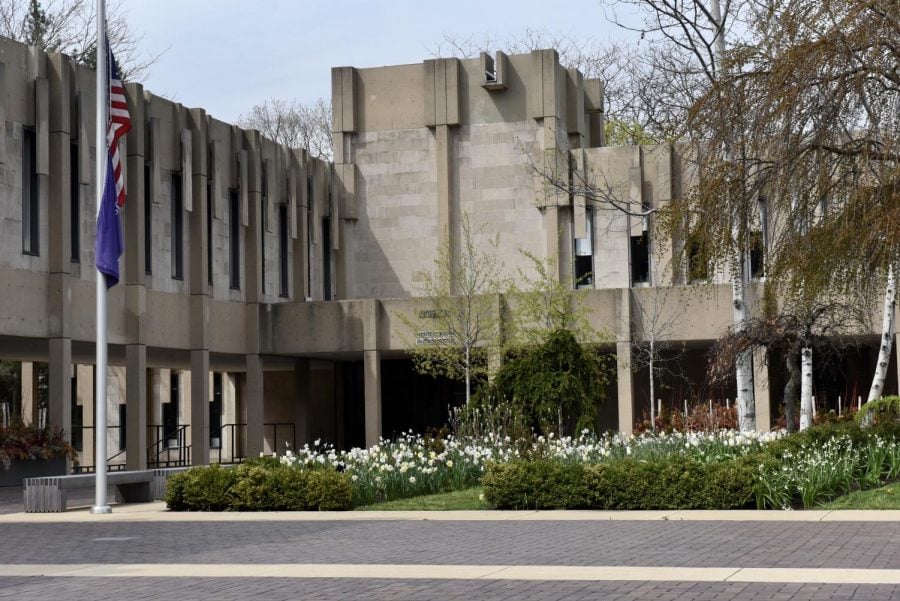Society of Fellows members publish letter urging the University to act on existing demands for marginalized communities
Daily file photo by Catherine Buchaniec
Rebecca Crown Center, which includes the office of the VP for Business and Finance. University administrators emphasized the Community Safety Advisory Board as a “clean slate.”
July 23, 2020
Members of the Society of Fellows published a letter July 15 urging the University to respond to calls for racial justice and equity.
Signed by all 12 current Presidential Fellows, the letter seeks to amplify the existing demands by campus groups such as Coalition NU, For Members Only and Northwestern University Graduate Workers, society members said. These demands include universal funding extensions, equity at The Graduate School and more.
“These organized and detailed calls to action have been advanced solely by the tireless, unpaid work of graduate and undergraduate student groups on top of their/our research, teaching and service that support the essential functions of the University,” the statement read. “University leadership has met this invaluable labor with relative silence and a lack of meaningful engagement on the part of university leadership with student organizers, even in the face of multiple public actions.”
The Society of Fellows is a group of Northwestern’s past and current recipients of the Presidential Fellowship, a highly selective two-year program that inducts six doctoral students per year. Selected students are provided with stipends, tuition, other forms of financial support and networking opportunities.
Ph.D candidate Heather McCambly, a signee and member of the society, co-authored the statement, part of a decision-making process that has been in the works since late May. She said members have completed academic works that address issues of health policy, equity and race.
McCambly said past and current Presidential Fellowship recipients need to support the well-researched demands by campus groups representing marginalized identities. The group wanted to push the University to act, rather than publishing an “in light of” statement, she said.
“In making these statements, we must not forget that black, brown and Indigenous students and faculty have been doing work on the ground for decades,” McCambly said. “When we say that we have an ‘unrelenting’ commitment, there’s some accountability there — not just to make that statement — but to act, and to act in particular on the types of needs and demands expressed by the communities themselves.”
Past Presidential Fellows, many of whom now work at academic institutions across the country, also signed the letter, Hannah Getachew-Smith, signee and Ph.D candidate, said. Including the past cohorts expresses that the racial inequity and institutional silence has been an ongoing issue, she said.
“It was very important to include past fellows to also show that this is not just an issue for right now,” Getachew-Smith said. “A lot of these issues (happened) years and years ago that haven’t been addressed.”
The letter was also induced by the University’s lack of action, despite months of advocacy from student groups, doctoral candidate and signee Lea Richardson said.
Even though the University announced July 9 that it will extend academic milestones for TGS students, this statement did not address the extension of funding and other measures for marginalized students have been demanding for months, Richardson said.
“(When Northwestern invites the fellows to events) they often say, ‘You represent the students of Northwestern as fellows,’” Richardson said. “We thought, in that role of trying to represent the students, we want to put another letter out there… seconding the call to action.”
As a first-generation Latina student, McCambly said it was an honor to receive the prestigious fellowship.
Being in the Society of Fellows was a “stark contrast” to her lived experience, she said, to be in a marginalized group and her voice be recognized by people in places of power.
“It can be very hard to get your voice heard as members of marginalized communities, in a predominantly white institution like Northwestern,” she said. “And I think that’s reflected in the lack of direct public response from the University.”
Email: yunkyokim2022@u.northwestern.edu
Twitter: @yunkyomoonk
Related Stories:
— TGS extends milestone deadlines, no funding extension guaranteed



